- Home
- Beverly Cleary
Ramona and Her Father Page 4
Ramona and Her Father Read online
Page 4
Ramona felt let down, although she was not sure what she had expected. Anger, perhaps? Punishment? A promise to give up smoking?
The next morning the sign was gone, and that afternoon Ramona had to wait until Beezus came home from school to ask, “How do you spell pollution?” When Beezus printed it out on a piece of paper, Ramona went to work making a sign that said, Stop Air Pollution.
“Let me help,” said Beezus, and the two girls, kneeling on the floor, printed a dozen signs. Smoking Stinks. Cigarettes Start Forest Fires. Smoking Is Hazardous to Your Health. Ramona learned new words that afternoon.
Fortunately Mr. Quimby went out to examine the car, which was still making the tappety-tappety noise. This gave the girls a chance to tape the signs to the mantel, the refrigerator, the dining-room curtains, the door of the hall closet, and every other conspicuous place they could think of.
This time Mr. Quimby simply ignored the signs. Ramona and Beezus might as well have saved themselves a lot of work for all he seemed to notice. But how could he miss so many signs? He must be pretending. He had to be pretending. Obviously the girls would have to step up their campaign. By now they were running out of big pieces of paper, and they knew better than to ask their parents to buy more, not when the family was so short of money.
“We can make little signs on scraps of paper,” said Ramona, and that was what they did. Together they made tiny signs that said, No Smoking, Stop Air Pollution, Smoking Is Bad for Your Health, and Stamp Out Cigarettes. On some Ramona drew stick figures of people stretched out flat and dead, and on one, a cat on his back with his feet in the air. These they hid wherever their father was sure to find them—in his bathrobe pocket, fastened around the handle of his toothbrush with a rubber band, inside his shoes, under his electric razor.
Then they waited. And waited. Mr. Quimby said nothing while he continued to smoke. Ramona held her nose whenever she saw her father with a cigarette. He appeared not to notice. The girls felt discouraged and let down.
Once more Ramona and Beezus devised a plan, the most daring plan of all because they had to get hold of their father’s cigarettes just before dinner. Fortunately he had tinkered with the car, still trying to find the reason for the tappety-tappety-tap, and had to take a shower before dinner, which gave the girls barely enough time to carry out their plan.
All through dinner the girls exchanged excited glances, and by the time her father asked her to fetch an ashtray, Ramona could hardly sit still she was so excited.
As usual her father pulled his cigarettes out of his shirt pocket. As usual he tapped the package against his hand, and as usual a cigarette, or what appeared to be a cigarette, slid out. Mr. Quimby must have sensed that what he thought was a cigarette was lighter than it should be, because he paused to look at it. While Ramona held her breath, he frowned, looked more closely, unrolled the paper, and discovered it was a tiny sign that said, Smoking Is Bad! Without a word, he crumpled it and pulled out another—he thought—cigarette, which turned out to be a sign saying, Stamp Out Cigarettes! Mr. Quimby crumpled it and tossed it onto the table along with the first sign.
“Ramona.” Mr. Quimby’s voice was stern. “My grandmother used to say, ‘First time is funny, second time is silly—’” Mr. Quimby’s grandmother’s wisdom was interrupted by a fit of coughing.
Ramona was frightened. Maybe her father’s lungs already had begun to turn black.
Beezus looked triumphant. See, we told you smoking was bad for you, she was clearly thinking.
Mrs. Quimby looked both amused and concerned.
Mr. Quimby looked embarrassed, pounded himself on the chest with his fist, took a sip of coffee, and said, “Something must have caught in my throat.” When his family remained silent, he said, “All right, Ramona. As I was saying, enough is enough.”
Ramona scowled and slid down in her chair. Nothing was ever fair for second graders. Beezus helped, but Ramona was getting all the blame. She also felt defeated. Nobody ever paid any attention to second graders except to scold them. No matter how hard she tried to save her father’s life, he was not going to let her save it.
Ramona gave up, and soon found she missed the excitement of planning the next step in her campaign against her father’s smoking. Her afternoons after school seemed empty. Howie was home with tonsillitis, and she had no one to play with. She wished there were more children her age in her neighborhood. She was so lonely she picked up the telephone and dialed the Quimbys’ telephone number to see if she could answer herself. All she got was a busy signal and a reprimand from her father for playing with the telephone when someone might be trying to reach him about a job.
On top of all this, the family had pumpkin pie for dinner.
“Not again!” protested Beezus. The family had eaten pumpkin pie and pumpkin custard since the night the cat ate part of the jack-o’-lantern. Beezus had once told Ramona that she thought her mother had tried to hide pumpkin in the meat loaf, but she wasn’t sure because everything was all ground up together.
“I’m sorry, but there aren’t many pumpkin recipes. I can’t bear to waste good food,” said Mrs. Quimby. “But I do remember seeing a recipe for pumpkin soup someplace—”
“No!” Her family was unanimous.
Ramona was so disappointed because her father had ignored all her little signs that she did not feel much like eating, and especially not pumpkin pie for what seemed like the hundredth time. She eyed her triangle of pie and knew she could not make it go down. She was sick of pumpkin. “Are you sure you cut off all the parts with cat spit on them?” she asked her mother.
“Ramona!” Mr. Quimby, who had been stirring his coffee, dropped his spoon. “Please! We are eating.”
They had been eating, but after Ramona’s remark no one ate a bite of pie.
Mr. Quimby continued to smoke, and Ramona continued to worry. Then one afternoon, when Ramona came home from school, she found the back door locked. When she pounded on it with her fist, no one answered. She went to the front door, rang the doorbell, and waited. Silence. Lonely silence. She tried the door even though she knew it was locked. More silence. Nothing like this had ever happened to Ramona before. Someone was always waiting when she came home from school.
Ramona was frightened. Tears filled her eyes as she sat down on the cold concrete steps to think. Where could her father be? She thought of her friends at school, Davy and Sharon, who did not have fathers. Where had their fathers gone? Everybody had a father sometime. Where could they go?
Ramona’s insides tightened with fear. Maybe her father was angry with her. Maybe he had gone away because she tried to make him stop smoking. She thought she was saving his life, but maybe she was being mean to him. Her mother said she must not annoy her father, because he was worried about being out of work. Maybe she had made him so angry he did not love her anymore. Maybe he had gone away because he did not love her. She thought of all the scary things she had seen on television—houses that had fallen down in earthquakes, people shooting people, big hairy men on motor-cycles—and knew she needed her father to keep her safe.
The cold from the concrete seeped through Ramona’s clothes. She wrapped her arms around her knees to keep warm as she watched a dried leaf scratch along the driveway in the autumn wind. She listened to the honking of a flock of wild geese flying through the gray clouds on their way south for the winter. They came from Canada, her father had once told her, but that was before he had gone away. Raindrops began to dot the driveway, and tears dotted Ramona’s skirt. She put her head down on her knees and cried. Why had she been so mean to her father? If he ever came back he could smoke all he wanted, fill the ashtrays and turn the air blue, and she wouldn’t say a single word. She just wanted her father back, black lungs and all.
And suddenly there he was, scrunching through the leaves on the driveway with the collar of his windbreaker turned up against the wind and his old fishing hat pulled down over his eyes. “Sorry I’m late,” he said, as he got out his key. “I
s that what all this boohooing is about?”
Ramona wiped her sweater sleeve across her nose and stood up. She was so glad to see her father and so relieved that he had not gone away, that anger blazed up. Her tears became angry tears. Fathers were not supposed to worry their little girls. “Where have you been?” she demanded. “You’re supposed to be here when I come home from school! I thought you had gone away and left me.”
“Take it easy. I wouldn’t go off and leave you. Why would I do a thing like that?” Mr. Quimby unlocked the door and, with a hand on Ramona’s shoulder, guided her into the living room. “I’m sorry I had to worry you. I was collecting my unemployment insurance, and I had to wait in a long line.”
Ramona’s anger faded. She knew all about long lines and understood how difficult they were. She had waited in lines for her turn at the slides in the park, she had waited in lines in the school lunchroom back in the days when her family could spare lunch money once in a while, she had waited in lines with her mother at the check-out counter in the market, when she was little she had waited in long, long lines to see Santa Claus in the department store, and—these were the worst, most boring lines of all—she had waited in lines with her mother in the bank. She felt bad because her father had had to wait in line, and she also understood that collecting unemployment insurance did not make him happy.
“Did somebody try to push ahead of you?” Ramona was wise in the ways of lines.
“No. The line was unusually long today.” Mr. Quimby went into the kitchen to make himself a cup of instant coffee. While he waited for the water to heat, he poured Ramona a glass of milk and gave her a graham cracker.
“Feeling better?” he asked.
Ramona looked at her father over the rim of her glass and nodded, spilling milk down her front. Silently he handed her a dish towel to wipe up while he poured hot water over the instant coffee in his mug. Then he reached into his shirt pocket, pulled out a package of cigarettes, looked at it a moment, and tossed it onto the counter. Ramona had never seen her father do this before. Could it be…
Mr. Quimby leaned against the counter and took a sip of coffee. “What would you like to do?” he asked Ramona.
Ramona considered before she answered. “Something big and important.” But what? she wondered. Break a record in that book of records Beezus talked about? Climb Mount Hood?
“Such as?” her father asked.
Ramona finished scrubbing the front of her sweater with the dish towel. “Well—” she said, thinking. “You know that big bridge across the Columbia River?”
“Yes. The Interstate Bridge. The one we cross when we drive to Vancouver.”
“I’ve always wanted to stop on that bridge and get out of the car and stand with one foot in Oregon and one foot in Washington.”
“A good idea, but not practical,” said Mr. Quimby. “Your mother has the car, and I doubt if cars are allowed to stop on the bridge. What else?”
“It’s not exactly important, but I always like to crayon,” said Ramona. How long would her father leave his cigarettes on the counter?
Mr. Quimby set his cup down. “I have a great idea! Let’s draw the longest picture in the world.” He opened a drawer and pulled out a roll of shelf paper. When he tried to unroll it on the kitchen floor, the paper rolled itself up again. Ramona quickly solved that problem by Scotch-taping the end of the roll to the floor. Together she and her father unrolled the paper across the kitchen and knelt with a box of crayons between them.
“What shall we draw?” she asked.
“How about the state of Oregon?” he suggested. “That’s big enough.”
Ramona’s imagination was excited. “I’ll begin with the Interstate Bridge,” she said.
“And I’ll tackle Mount Hood,” said her father.
Together they went to work, Ramona on the end of the shelf paper and her father halfway across the kitchen. With crayons Ramona drew a long black bridge with a girl standing astride a line in the center. She drew blue water under the bridge, even though the Columbia River always looked gray. She added gray clouds, gray dots for raindrops, and all the while she was drawing she was trying to find courage to tell her father something.
Ramona glanced at her father’s picture, and sure enough he had drawn Mount Hood peaked with a hump on the south side exactly the way it looked in real life on the days when the clouds lifted.
“I think you draw better than anybody in the whole world,” said Ramona.
Mr. Quimby smiled. “Not quite,” he said.
“Daddy—” Ramona summoned courage. “I’m sorry I was mean to you.”
“You weren’t mean.” Mr. Quimby was adding trees at the base of the mountain. “You’re right, you know.”
“Am I?” Ramona wanted to be sure.
“Yes.”
This answer gave Ramona even more courage. “Is that why you didn’t have a cigarette with your coffee? Are you going to stop smoking?”
“I’ll try,” answered Mr. Quimby, his eyes on his drawing. “I’ll try.”
Ramona was filled with joy, enthusiasm, and relief. “You can do it, Daddy! I know you can do it.”
Her father seemed less positive. “I hope so,” he answered, “but if I succeed, Picky-picky will still have to eat Puss-puddy.”
“He can try, too,” said Ramona and slashed dark V’s across her gray sky to represent a flock of geese flying south for the winter.
5
Beezus’s Creative Writing
The Quimby women, as Mr. Quimby referred to his wife and daughters, were enthusiastic about Mr. Quimby’s decision to give up smoking. He was less enthusiastic because, after all, he was the one who had to break the habit.
Ramona took charge. She collected all her father’s cigarettes and threw them in the garbage, slamming down the lid of the can with a satisfying crash, a crash much less satisfying to her father, who looked as if he wanted those cigarettes back.
“I was planning to cut down gradually,” he said. “One less cigarette each day.”
“That’s not what you said,” Ramona informed him. “You said you would try to give up smoking, not try to cut down gradually.”
There followed an even more trying time in the Quimby household. Out of habit Mr. Quimby frequently reached for cigarettes that were no longer in his pocket. He made repeated trips to the refrigerator, looking for something to nibble on. He thought he was gaining weight. Worst of all, he was even crosser than when he first lost his job.
With a cross father, a tired mother, a sister who worried about creative writing, and a cat who grudgingly ate his Puss-puddy, Ramona felt she was the only happy member of the family left. Even she had run out of ways to amuse herself. She continued to add to the longest picture in the world, but she really wanted to run and yell and make a lot of noise to show how relieved she was that her father was giving up smoking.
One afternoon Ramona was on her knees on the kitchen floor working on her picture when Beezus came home from school, dropped her books on the kitchen table, and said, “Well, it’s come.”
Ramona looked up from the picture of Glenwood School she was drawing on the roll of shelf paper taped to the floor. Mr. Quimby, who had a dish towel tucked into his belt for an apron, turned from the kitchen sink. “What’s come?” he asked. Although it was late in the afternoon, he was washing the breakfast dishes. He had been interviewed for two different jobs that morning.
“Creative writing.” Beezus’s voice was filled with gloom.
“You make it sound like a calamity,” said her father.
Beezus sighed. “Well—maybe it won’t be so bad this time. We aren’t supposed to write stories or poems after all.”
“Then what does Mrs. Mester mean by creative?”
“Oh, you know….” Beezus twirled around on one toe to define creative.
“What are you supposed to write if you don’t write a story or a poem?” asked Ramona. “Arithmetic problems?”
Beezus continued to twi
rl as if spinning might inspire her. “She said we should interview some old person and ask questions about something they did when they were our age. She said she would run off what we wrote on the ditto machine, and we could make a book.” She stopped twirling to catch the dish towel her father tossed to her. “Do we know anyone who helped build a log cabin or something like that?”
“I’m afraid not,” said Mr. Quimby. “We don’t know anybody who skinned buffalo either. How old is old?”
“The older the better,” said Beezus.
“Mrs. Swink is pretty old,” volunteered Ramona. Mrs. Swink was a widow who lived in the house on the corner and drove an old sedan that Mr. Quimby admiringly called a real collector’s item.
“Yes, but she wears polyester pant suits,” said Beezus, who had grown critical of clothing lately. She did not approve of polyester pant suits, white shoes, or Ramona’s T-shirt with Rockaway Beach printed on the front.
“Mrs. Swink is old inside the pant suits,” Ramona pointed out.
Beezus made a face. “I can’t go barging in on her all by myself and ask her a bunch of questions.” Beezus was the kind of girl who never wanted to go next door to borrow an egg and who dreaded having to sell mints for the Campfire Girls.
“I’ll come,” said Ramona, who was always eager to go next door to borrow an egg and looked forward to being old enough to sell mints.
“You don’t barge in,” said Mr. Quimby, wringing out the dishcloth. “You phone and make an appointment. Go on. Phone her now and get it over.”
Beezus put her hand on the telephone book. “But what’ll I say?” she asked.
“Just explain what you want and see what she says,” said Mr. Quimby. “She can’t bite you over the telephone.”
Beezus appeared to be thinking hard. “OK,” she said with some reluctance, “but you don’t have to listen.”

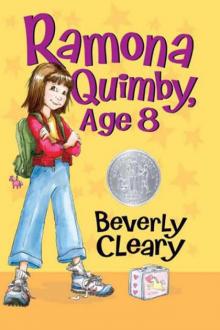 Ramona Quimby, Age 8
Ramona Quimby, Age 8 Dear Mr. Henshaw
Dear Mr. Henshaw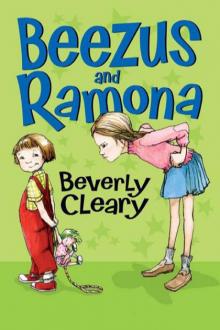 Beezus and Ramona
Beezus and Ramona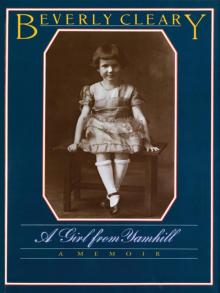 A Girl from Yamhill
A Girl from Yamhill Ramona Forever
Ramona Forever Jean and Johnny
Jean and Johnny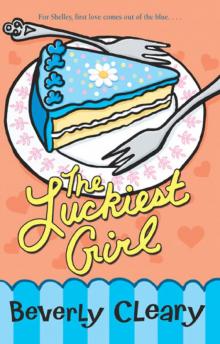 The Luckiest Girl
The Luckiest Girl Emily's Runaway Imagination
Emily's Runaway Imagination Ribsy
Ribsy Ramona the Pest
Ramona the Pest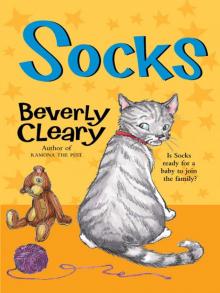 Socks
Socks Ramona's World
Ramona's World Strider
Strider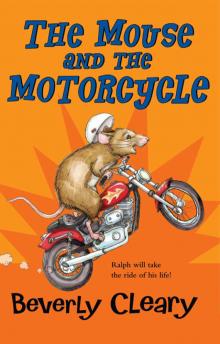 The Mouse and the Motorcycle
The Mouse and the Motorcycle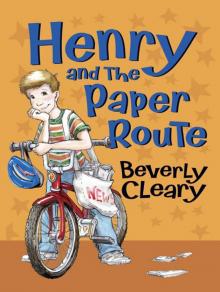 Henry and the Paper Route
Henry and the Paper Route Ramona the Brave
Ramona the Brave Henry Huggins
Henry Huggins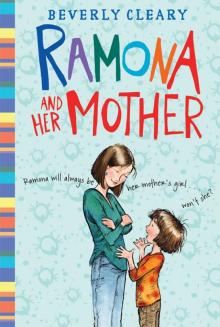 Ramona and Her Mother
Ramona and Her Mother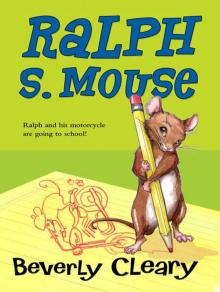 Ralph S. Mouse
Ralph S. Mouse Sister of the Bride
Sister of the Bride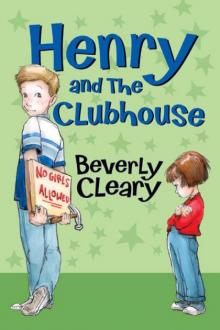 Henry and the Clubhouse
Henry and the Clubhouse Muggie Maggie
Muggie Maggie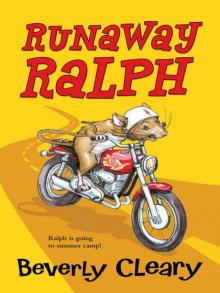 Runaway Ralph
Runaway Ralph Ramona and Her Father
Ramona and Her Father Henry and Ribsy
Henry and Ribsy Henry and Beezus
Henry and Beezus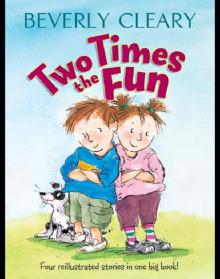 Two Times the Fun
Two Times the Fun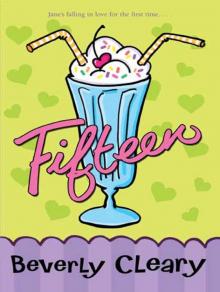 Fifteen
Fifteen Mitch and Amy
Mitch and Amy